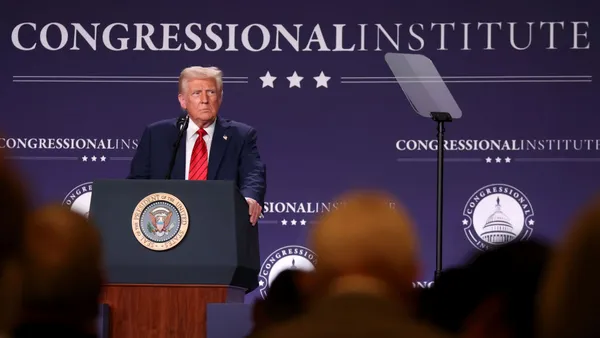Dive Brief:
- Norwich University announced Wednesday a new income share agreement program that gives students lower tuition at the private military college, but requires them to pay for that discount with a set percentage of their future income.
- Norwich is working with Vemo Education, an education technology company that has contracted with other colleges to provide about $23 million to fund similar income share agreements, including at Purdue University in Indiana, Lackawanna College in Pennsylvania and Clarkson University in New York.
- Norwich, which is located in Northfield, Vermont, will offer the option to sophomores, juniors and seniors to “expand access and increase affordability, student retention and degree completion,” according to a university news release.
Dive Insight:
According to The Washington Post, a number of small firms and nonprofits have begun similar income share agreement programs often aimed at students in short-term training programs. The agreements have received more attention in higher education since Purdue began offering its Back a Boiler program in 2016. Purdue’s prominent president, former Indiana Gov. Mitch Daniels, has been a strong advocate for income share agreemtnes and other creative approaches to college financing.
The 463 Purdue students who had by January accepted a total of $6 million through income shares are in 117 different majors, but most are STEM fields, according to the university. Students in fields where higher income is projected are the the best fit for the program, advocates say.
Lackawanna and Clarkson are using their own funds to support their programs. Lackawanna has a $5 million endowment and many students who need financial aid to pay for the college’s $15,000 tuition. "We have a needy population. Many are single parents or working adults returning back to school," Lackawanna President Mark Volk told The Post. "Having this tool as another way to alleviate the burden of paying for college just makes sense." Many students are pursuing degrees in fields where they could make enough to repay the 3% of income that the program requires, he said.
However, some critics are concerned that the concept really doesn’t make college more affordable and might be just as harmful as other forms of debt. Others note the market for income share agreements is largely unregulated.
The Washington Post described the agreements this way: “Imagine two students, each agreeing to pay 5% of their income for five years on a $10,000 agreement. If the first student lands a $30,000 job after graduation, he could pay a total of $7,500 by the time the contract is up. But if the second student scores a $60,000 job, she could end up repaying $15,000. Both could pay more if they get raises along the way, which could make an ISA more expensive than a traditional loan.”
Two bills in Congress that would regulate income share agreements would set caps on borrowing and keep lenders from demanding payment if student income falls below a certain level. They were introduced last year, but both have stalled in committee.












